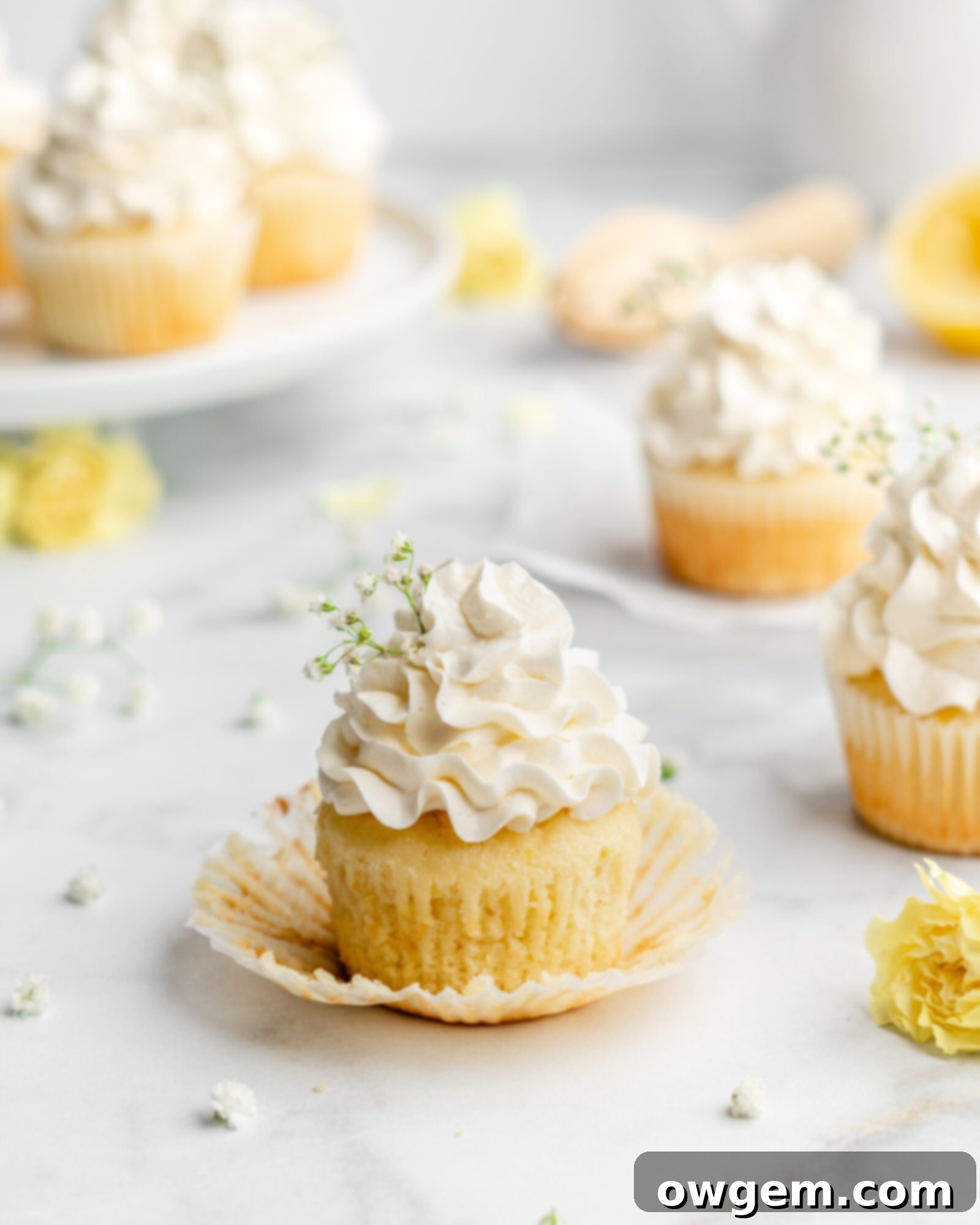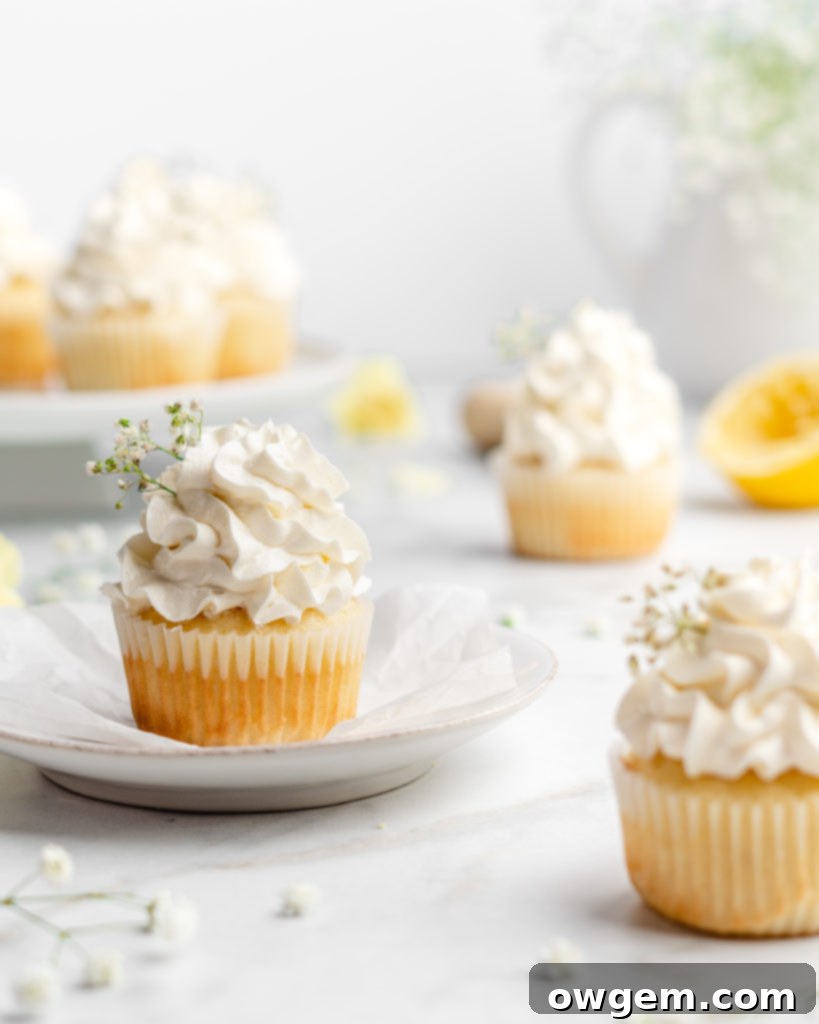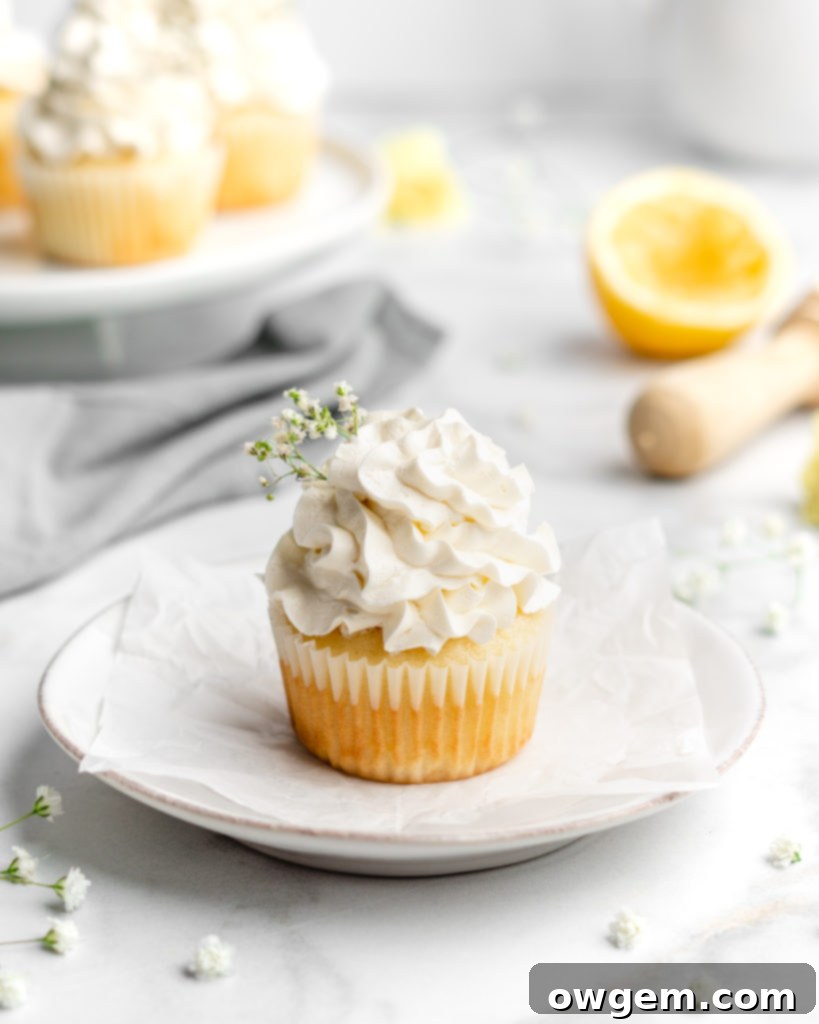Exquisite Lemon and Elderflower Cupcakes: A Royal-Inspired Delight
Step into a world of delicate flavors with these enchanting Lemon and Elderflower Cupcakes. Inspired by the memorable wedding cake of the Duke and Duchess of Sussex, this recipe transforms that iconic flavor combination into delightful individual treats. Imagine light, fluffy lemon-flavored cupcakes, bursting with bright citrus notes, crowned with a dreamy, silky-smooth elderflower Swiss meringue buttercream. The harmonious blend of zesty lemon and subtly sweet, floral elderflower creates a truly remarkable dessert that is both sophisticated and irresistibly delicious. It’s a taste experience that balances vibrant freshness with elegant sweetness, perfect for any occasion that calls for something truly special.
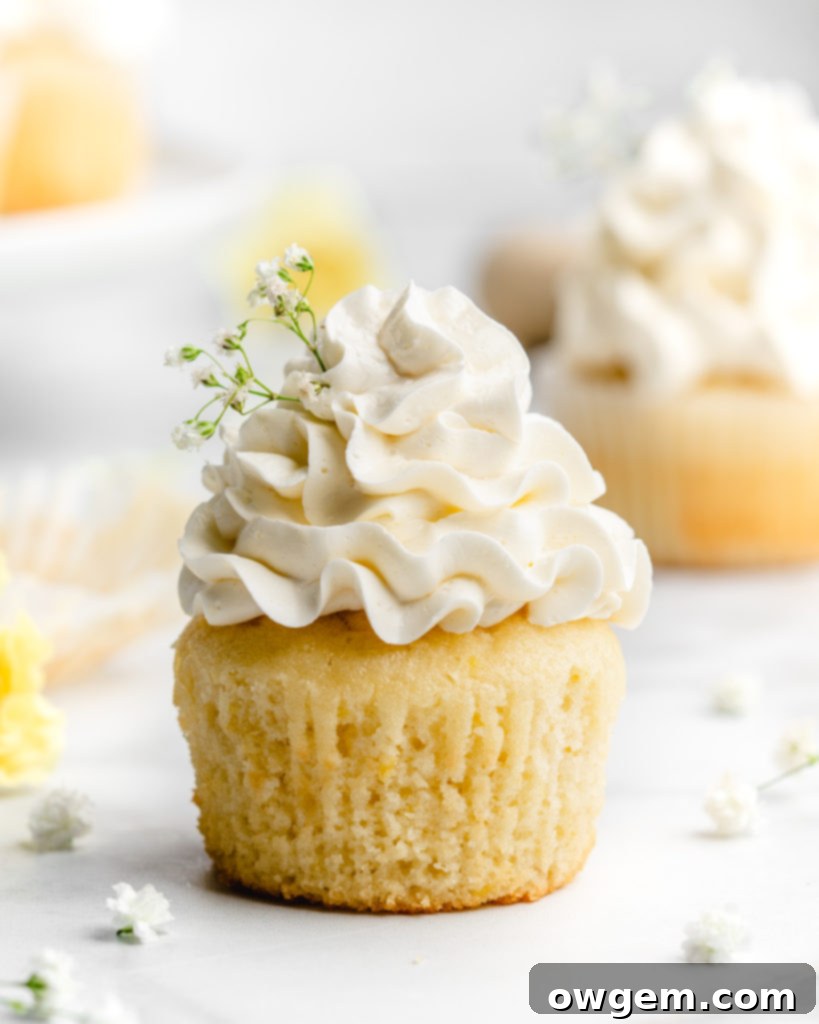
The Royal Inspiration: Lemon and Elderflower’s Timeless Appeal
The combination of lemon and elderflower soared in popularity after it was chosen for the Duke and Duchess of Sussex’s wedding cake. This pairing isn’t just a modern trend; it’s a classic for a reason. Lemon, with its bright, acidic, and wonderfully aromatic zest, cuts through richness and invigorates the palate. Elderflower, derived from the blossoms of the elder tree, introduces a delicate, subtly sweet, and wonderfully fragrant floral note that complements lemon’s zing without overpowering it. Together, they create a balanced and sophisticated profile that is both refreshing and comforting. These cupcakes capture that very essence, bringing a touch of royal elegance to your home baking.
Achieving Supreme Moisture: Why We Choose Oil Over Butter for Cupcakes
When exploring this recipe for Lemon and Elderflower Cupcakes, you’ll observe a deliberate choice: the use of oil as the primary fat instead of traditional butter. This decision is not arbitrary; it’s rooted in a desire to achieve an unparalleled texture in your cupcakes. Firstly, from a practical standpoint, baking with oil offers remarkable ease. There’s no need for the foresight to soften butter to room temperature, nor the meticulous creaming process required to aerate butter and sugar properly. This streamlines your baking preparation significantly.
Beyond convenience, the textural benefits of oil are genuinely superior for many cake and cupcake recipes. Oil-based cakes are consistently more moist, tender, and less dense than their butter-based counterparts. This is due to several key factors. Oil remains liquid at room temperature, which contributes to a softer crumb that stays moist for longer periods. Butter, on the other hand, is a solid fat, and as it cools after baking, it can make the cake’s texture firmer. Furthermore, oil is lighter by volume compared to butter, and it excels at encapsulating flour molecules. This superior encapsulation leads to better lubrication within the batter and, crucially, less gluten formation. Reduced gluten development results in a more tender crumb, preventing the cake from becoming tough or chewy.
The absence of butter flavor might seem like a drawback, but in heavily flavored recipes like these Lemon and Elderflower Cupcakes, butter’s subtle notes would largely be overshadowed. The vibrant lemon zest and extract, along with the distinct elderflower, carry the flavor profile entirely. This makes oil an ideal choice, providing a superior texture without compromising the intended taste. It’s a win-win situation, ensuring your cupcakes are irresistibly soft, moist, and flavorful.
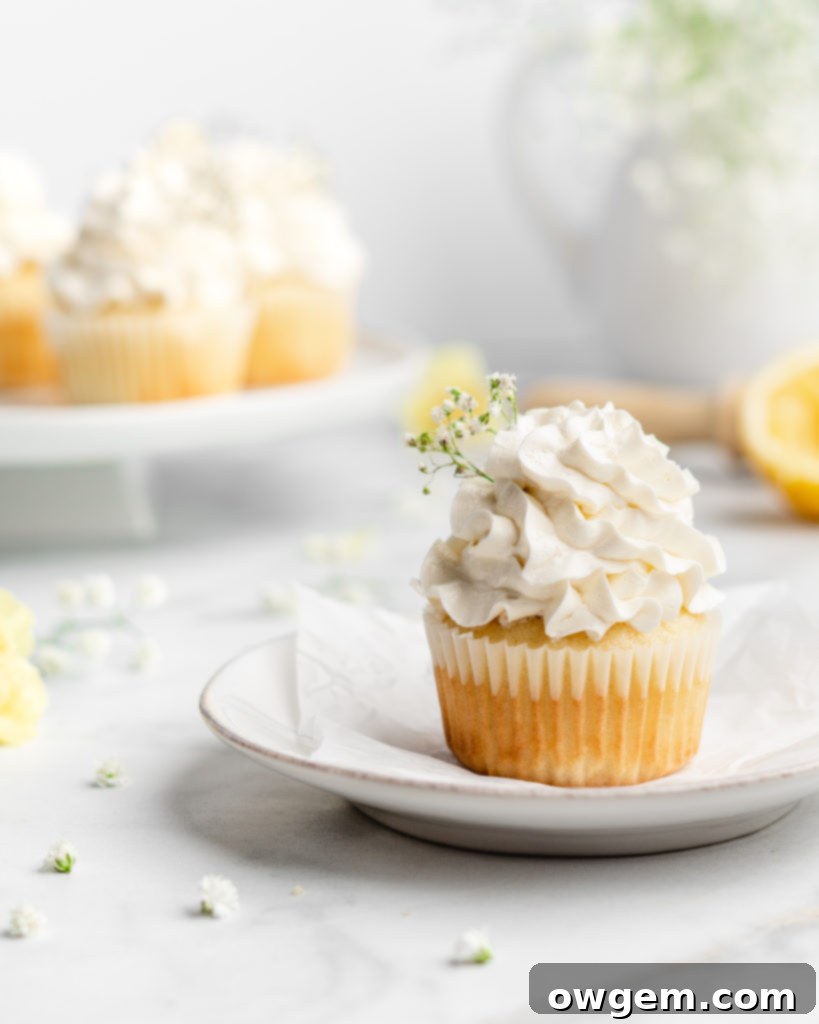
Mastering the Velvety Smooth Elderflower Swiss Meringue Buttercream
While the name “Swiss Meringue Buttercream” (SMB) might sound intimidating, this elegant frosting is surprisingly accessible and well worth the extra effort. It does take a little more time and precision than a traditional American buttercream, but the rewards are immense. The flavor and texture of Swiss Meringue Buttercream are truly exceptional. It’s delicately sweet, thanks to the sugar being cooked with the egg whites, resulting in a less cloyingly sweet frosting compared to powdered sugar-based buttercreams. Its signature characteristic is its incredible silkiness and smoothness, which melts beautifully in your mouth. This luxurious texture, combined with the subtle floral notes of elderflower, creates an absolutely perfect pairing for the bright, citrusy lemon cupcakes, elevating the entire dessert experience.
The secret to SMB’s stability and light texture lies in the meringue base. Heating the egg whites and sugar together not only dissolves the sugar completely but also pasteurizes the egg whites, making the buttercream safer to consume and incredibly stable. The subsequent whipping process incorporates a significant amount of air, creating a fluffy and airy meringue that then emulsifies with the butter to form a truly exquisite buttercream. Don’t be discouraged by the process; with a few key steps and patience, you’ll be able to create this impressive frosting every time.
To achieve the perfect Elderflower Swiss Meringue Buttercream, follow these detailed steps:
Begin by combining your large egg whites and granulated sugar in a clean, heatproof metal bowl. This bowl should comfortably fit over a pot of simmering water, creating a double boiler. Ensure the bottom of the metal bowl does not touch the simmering water; you want the steam to gently heat the mixture, not direct contact with the boiling water, which could scramble the eggs. Whisk the egg white and sugar mixture **constantly** over the simmering water. This continuous whisking is crucial to prevent the egg whites from cooking unevenly or curdling. Continue whisking until the mixture reaches a temperature of 160°F or 70°C when measured with a reliable instant-read thermometer. At this point, the sugar should be completely dissolved, and the mixture will be hot to the touch. Immediately remove the bowl from the heat and transfer the mixture to the bowl of your stand mixer. Using the whisk attachment, whip the hot meringue on high speed for a full **7 minutes**. During this time, the mixture will cool down, thicken significantly, become glossy, and form stiff, stable peaks. Once the meringue is glossy, thick, and holds firm peaks, reduce the stand mixer speed to low. Gradually begin adding the room-temperature unsalted butter, one tablespoon at a time. It’s important to allow each addition of butter to be somewhat incorporated into the meringue before adding the next. Patience here is key. After all the butter has been added, the mixture might look somewhat soupy, curdled, or even separated – do not panic! This is a very common stage in SMB making. Increase the stand mixer speed back to high and continue beating vigorously. Trust the process; the buttercream will come together and transform into a smooth, velvety, and cohesive frosting. Once it’s smooth and perfectly emulsified, reduce the speed again and incorporate the elderflower liqueur and a pinch of salt. Beat just until everything is well combined and evenly distributed. Your exquisite Elderflower Swiss Meringue Buttercream is now ready to crown your lemon cupcakes!
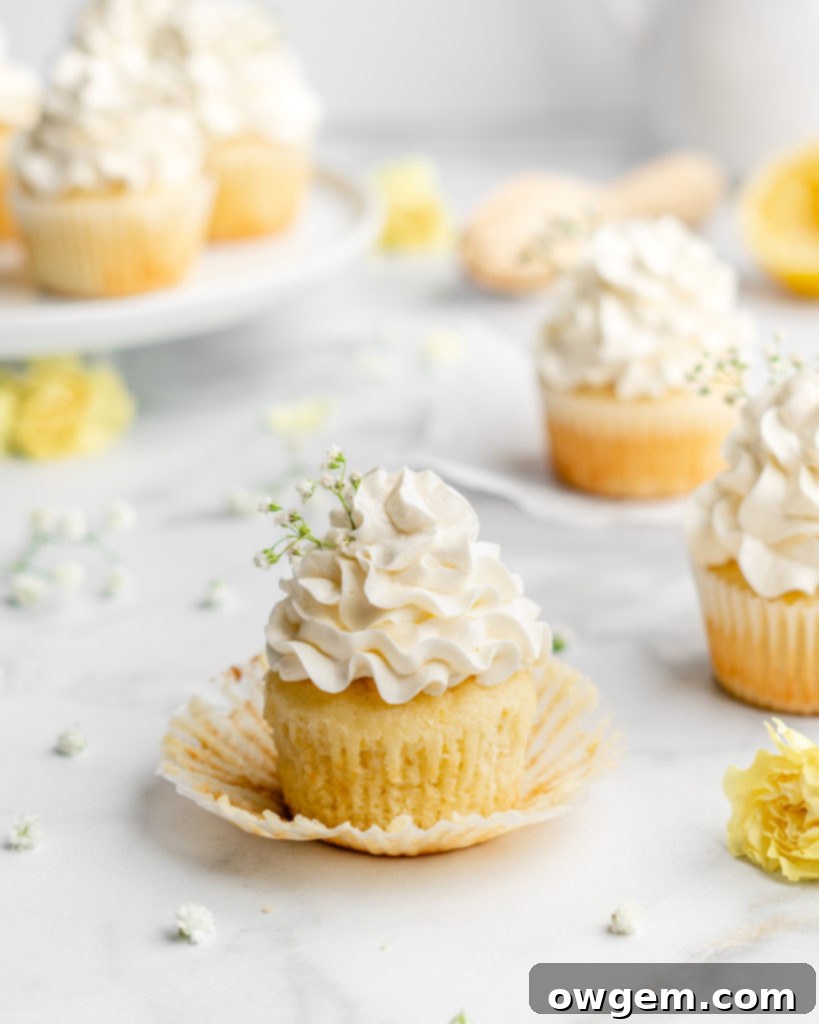
Customizing Your Lemon and Elderflower Cupcakes
This recipe offers a beautiful foundation, but feel free to personalize it to your taste or adapt it based on available ingredients.
- Buttercream Alternatives: If the idea of making Swiss Meringue Buttercream feels a little too ambitious, or if you simply prefer a different style, you can absolutely substitute it with your favorite traditional buttercream recipe. When doing so, simply replace the vanilla extract (if called for) with elderflower liqueur. A good starting point would be to use about 3-4 tablespoons of elderflower liqueur for every 1 cup of butter in your buttercream recipe, adjusting to taste.
- Elderflower Liqueur vs. Cordial: For the elderflower flavor, elderflower liqueur provides a more intense and often slightly alcoholic depth. However, if you prefer to avoid alcohol or cannot find the liqueur, elderflower cordial is an excellent non-alcoholic alternative. Start with the same quantity and adjust as needed, keeping in mind cordials are often sweeter, so you might want to slightly reduce the sugar in your buttercream base if using.
- Adding Berries: For an extra layer of flavor and visual appeal, consider folding a handful of fresh raspberries or blueberries into your lemon cupcake batter just before baking. The tartness of the berries pairs wonderfully with lemon and elderflower.
- Lemon Drizzle: For an even more intense lemon flavor, you could prepare a simple lemon drizzle to brush over the cooled cupcakes before frosting. Mix powdered sugar with fresh lemon juice until you reach a pourable consistency.
- Garnishes: Elevate the presentation with elegant garnishes. Fresh lemon zest, small edible flowers (like violas or pansies), or a sprig of fresh mint can add a beautiful finishing touch.
These variations allow you to make the Lemon and Elderflower Cupcakes uniquely yours, catering to different preferences and occasions.
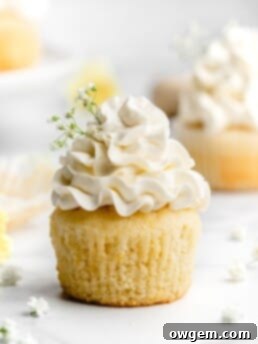
Get the Recipe:
Lemon and Elderflower Cupcakes
Pin
Rate
Ingredients
Lemon Cupcakes
- 2 ¼ cups All Purpose Flour,, measured correctly †
- 1 ½ tsp Baking Powder
- 1/2 tsp Table Salt
- 1 ½ cups Granulated Sugar,, divided
- Zest of 2 Large Lemons
- 3 Large Whole Eggs
- 1 ½ tsp Vanilla Extract
- 1 tsp Lemon Extract
- 3/4 cup Vegetable Oil (or other neutral oil)
- 1 cup Full Fat Sour Cream
- Juice of ½ of a Lemon (freshly squeezed)
Elderflower Swiss Meringue Buttercream
- 3 Large Egg Whites
- 1 cup White Granulated Sugar
- 1 ½ cups Unsalted Butter,, at room temperature (or very slightly colder), cut into tablespoon-sized pieces
- 2-3 tbsp Elderflower Liqueur (or cordial)
- Pinch of Salt
Instructions
Lemon Cupcakes
-
Begin by preheating your oven to 350°F (175°C). Line two standard 12-cup cupcake pans with paper liners, ensuring they are evenly spaced. In a generously sized mixing bowl, combine the all-purpose flour, baking powder, and table salt. Whisk these dry ingredients thoroughly to ensure they are well combined and evenly distributed. This step helps prevent lumps and ensures a consistent rise in your cupcakes. In a separate, smaller bowl, add ½ cup of the granulated sugar along with the finely grated zest of 2 lemons. Using your fingertips, rub the lemon zest into the sugar for about 1-2 minutes. This “zest-infused sugar” technique releases the aromatic oils from the lemon zest, intensifying the natural lemon flavor in your cupcakes. Set this fragrant sugar aside.
-
Now, prepare your stand mixer, fitted with the paddle attachment. Add the large whole eggs, the remaining 1 cup of granulated sugar, the lemon-zest-infused sugar you prepared earlier, vanilla extract, and lemon extract into the mixer bowl. Beat this mixture on high speed for approximately 5 minutes. During this time, the mixture will undergo a significant transformation: it should become noticeably thick, fluffy, and its volume will nearly triple. This aeration is crucial for a light and airy cupcake texture. Once light and voluminous, slowly drizzle in the vegetable oil while the mixer is still running on low to medium speed. After all the oil has been added, continue beating for an additional minute to ensure it is fully emulsified into the mixture.
-
Reduce the stand mixer speed to its lowest setting. Gradually add the dry flour mixture to the wet ingredients, mixing only until just combined. Be careful not to overmix at this stage, as overmixing can develop gluten and lead to tough cupcakes. Scrape down the sides of the bowl as needed. Next, add the full-fat sour cream and the freshly squeezed juice of half a lemon. Mix again on low speed, only until the batter becomes smooth and no streaks of flour remain. Divide the batter evenly among the prepared cupcake liners, filling each approximately two-thirds full. This allows room for the cupcakes to rise without overflowing. Bake in the preheated oven for around 18 minutes, or until a wooden toothpick inserted into the center of a cupcake comes out clean. Allow the cupcakes to cool completely in the pans for a few minutes before transferring them to a wire rack to finish cooling. It is essential for them to be completely cool before frosting to prevent the buttercream from melting.
Elderflower Swiss Meringue Buttercream
-
In a heatproof metal bowl (ideally the bowl of your stand mixer if it’s metal), combine the large egg whites and granulated sugar. Place this bowl over a pot of simmering water, ensuring the bottom of the bowl does not touch the water – you are using a double boiler setup. Whisk the mixture **constantly** by hand. This continuous movement is vital to prevent the egg whites from scrambling as they heat. Continue whisking until the mixture reaches a temperature of 165°F (70°C) on an instant-read thermometer and the sugar is completely dissolved. Immediately remove the bowl from the heat.
-
Transfer the bowl to your stand mixer, fitted with the whisk attachment. Beat the meringue on high speed for approximately 7 minutes. The meringue will cool down, increase significantly in volume, become thick, glossy, and form firm, stiff peaks. This indicates a stable meringue base.
-
Reduce the stand mixer speed to low. Begin adding the room-temperature unsalted butter, two tablespoons at a time. It’s important to allow each addition of butter to incorporate slightly before adding the next piece. Do not rush this step. After all the butter has been added, the buttercream might appear curdled, soupy, or separated. This is a normal stage in Swiss Meringue Buttercream preparation, often referred to as “the breaking point.” Do not despair! Increase the stand mixer speed back to high and continue beating. The mixture will magically come together, transforming into a smooth, velvety, and cohesive buttercream. Keep beating until it achieves this desired consistency.
-
Once the buttercream is smooth, reduce the speed to low again. Add the elderflower liqueur (or cordial) and the pinch of salt. Beat just until these final ingredients are well combined and evenly distributed throughout the buttercream. Avoid overmixing once the flavoring is added.
-
Transfer the finished Elderflower Swiss Meringue Buttercream to a piping bag fitted with your desired tip (a Wilton 2D tip, as mentioned, creates beautiful rosettes). Pipe the buttercream generously onto your completely cooled lemon cupcakes. Garnish as desired and serve immediately or store for later enjoyment.
